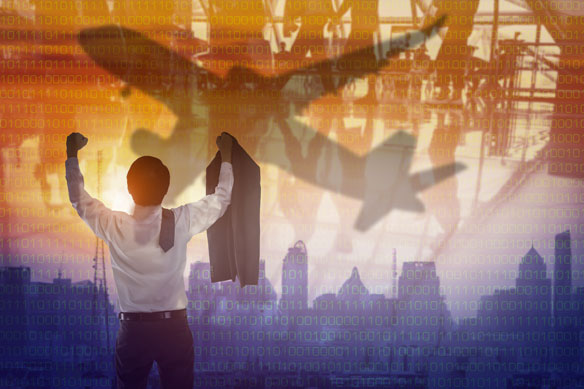
What are we “going back to?”

JASON MERRITHEW
As some parts of the world begin to start their return to their next normal, the question gets asked every day just what will that normal be? Not just for travel agencies, but for the broader economy, the answer to this question is vitally important as to the direction they take their businesses.

Meritthew
I have zero doubt that people will travel again. Zero. That being said, travel is based on consumer and business confidence and both have been deeply shaken.
Sky high unemployment rates, low savings rates and uncertain prospects for returning to work at scale. All of these factors together should give pause to an unbridled bullishness with respect to consumer behaviour.
Consumers could very well find themselves saving at a higher rate and not travel. Businesses may stay at lower staffing levels. Consumers could pay down debt and not travel. Businesses could invest more in video links and less on travel. Consumers could buy a home and not travel.
They may do any of these things out an abundance of caution, government requirements or lower household income. They may rush back onto the road in a “V” shaped travel recovery which sees airplanes packed daily before the end of summer. We just don’t know what will come next.
No more normal
Nothing that we have experienced over the last few months qualifies as normal. Was our pre-COVID travel world normal in the first place? Global tourist arrivals in 2018 topped 1.4 billion, more than doubling from the 2000 figure of 682 million.
New cruise ships launched every week, new resorts opened daily, hotel groups committed to open dozens of new properties per year each.
Is growth like that normal?
This is not a Silicon Valley SaaS business; this is a globally integrated industry which employs hundreds of millions globally.
Such extreme growths rates surely come at a cost.
I’m convinced that there will be changes to the tourism industry coming out of the COVID crisis. Not just negative change as the headlines like to focus on, I think a lot of positive change can come out of the tourism ‘restart’ or perhaps more accurately, a ‘reset.’
Over tourism awareness
Going into the COVID crisis, tourist destinations globally were dealing with the issues of ‘over tourism.’ Pre-crisis, tourist activity eclipsing local business activity in cities, arrivals sky high with no vacancy in major cities, increasing prices as a growing middle class in Asia puts its new dollars to work travelling the world.
Today, Venice’s canals are clear, Amsterdam’s side streets are quiet, Egypt’s pyramids are again devoid of tourists.
I believe it is inevitable that there are going to be tourism restrictions placed on certain destinations around the world.
This crisis might just provide the opportunity to put those restrictions in place in the interest of public health and maybe just not be in a huge rush to remove them.
The immense load of tourists has to place a strain on the infrastructure in these locales, has to lessen the experience of visiting when you are just one of thousands of daily tourists.
An overwhelmingly positive outcome of this crisis could be a re-examination of tourist limits in high traffic areas. Fewer, more meaningful experiences, would re-elevate travel to its pre-mass tourism level of impact and make a tour less like a quick photo stop.
More selective business travel
All operating businesses today have had to learn on the fly how to be a remote work organization. Most of them will be quick to return to their old habits of in office work but one of the areas where they may choose to continue to save money will be their business travel practices.
Domestic/Short haul travel is likely to come under significant pressure as without time zone challenges video conferencing could likely replace a meaningful percentage of in person meetings. There will still be more sporadic short haul business travel, but we have now learned that we can function remotely.
Long haul is another story, however.
Time zones and business cultures are much harder to overcome via video link and long haul trips are likely to continue at meaningfully the same rate, albeit companies sending road warriors back out there are likely to look for more densely packed meetings on individual trips instead of a 12 hour turn around to Paris.
Private experiences
Private tours are likely beneficiary of ‘public health awareness’ particularly among more affluent travellers.
The perceived benefits of smaller groups and more private experiences could range from anything from less ‘hurry up and wait’ in group tours to a more controlled transportation environment.
More affluent individuals are also in a category which is more insulated from the employment market to fund travel.
High end travellers are staying home not because they are out of work and lack cash flow, but because their governments have asked them to stay home and help save people’s lives.
They’ve of course stayed home, but as soon as able they are likely to return their previous habits, with a tendency towards private and exclusive experiences rather than general sightseeing experiences or beach vacations.
Transportation density
Let’s face it, it is difficult to maintain any type of separation in a crowded airplane.
With passenger densities on aircraft at an all-time high, public health and transportations authorities may begin to ask difficult questions of the airline industry and hotel industries with respect to their ability to help contain any future global health challenges.
It is already abundantly clear that an overnight stop to travel was devastating to economies as a whole, in particular for airlines.
Could any of these problems be assisted by lower density aircraft? That is likely a question which will be answered as some point.
What might lower density have on prices for air travel? Travellers today enjoy the lowest inflation adjusted prices for air travel since the dawn of the jet age. If prices have to come up because of lower densities, what impact might that have on demand? All questions that do not yet have answers but are certainly on the minds of airline executives around the world.
A return to travel is inevitable. I hope that this crisis has educated the world as to just how interconnected all of these systems are; taxi companies, airlines, hotels, cruise lines, tour operators, tour guides, maintenance staff etc.
The number of people that it takes to deliver a tourism experience to an individual traveller is staggering. I hope this crisis has also educated everybody as to how fragile the system is.
As a result, the importance of international cooperation, unselfish information sharing, collective sacrifice for the benefit of those most vulnerable and truthful and honest communication from leaders uninterested in blame but interested in collective good cannot be overstated.
Coordinated effort needed
What we have not yet to see is a coordinated global governmental and business strategy for a generally accepted set of practices for a truly globalized industry.
Until there is a consolidated infectious disease prevention and mitigation strategy across global governments, global transportation industries and global tourism operators, consumers are right to be cautious ask tough questions about safety.
Travellers cannot find themselves stranded as a result of disparate policy responses and differing standards of care.
Our industry came to a screeching, nausea-inducing halt overnight. We have a role to play in our industry’s ‘reset’ as well.
Coming out of this we can expect to see:
- Increased awareness of over tourism and the damage it does to our world
- Businesses changing their travel habits to bridge the need for face to face contact with employees’ desire for safety and time at home
- An increase in private tour experiences as people seek the perceived safety of smaller groups
- Lower density transportation options which make future pandemic responses easier
Let’s all cautiously take the first few steps towards making it an industry that doesn’t have to slam on the brakes but can instead ‘Be Water’ and flow on, no matter how disruptive the issues may seem.
Jason Merrithew is a Senior Vice President at Kognitiv Corporation, a Canadian technology company, and a General Partner of Peninsula Road Investments, an Advisory and Venture Capital firm based in Toronto. He is also the former President of Merit Travel and past chair of the WYSE Travel Confederation.
